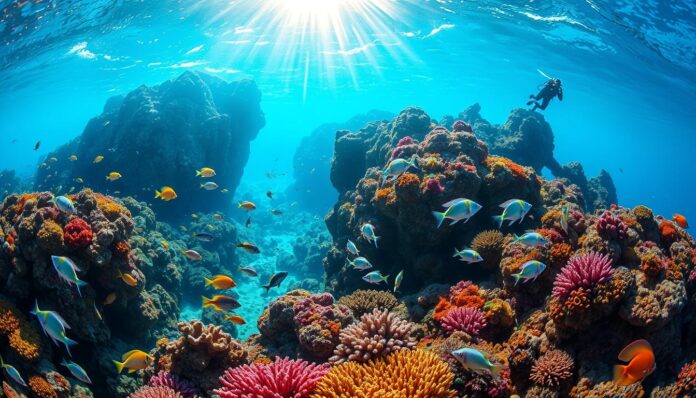| Best Time to Travel | November to April |
| What to Expect | Warm water, clear visibility, diverse marine life |
| Diving Conditions | Year-round, but best from November to April |
| Marine Life | Rays, sharks, turtles, dolphins, fish |
Are you ready to find an underwater paradise? The British Virgin Islands offer a scuba diving experience unlike any other. With over 60 pristine islands, there’s so much to explore beneath the waves.
Scuba diving here turns ordinary ocean exploration into an amazing adventure. The waters are crystal-clear, and the temperatures are just right. This makes it perfect for divers of all skill levels.
The British Virgin Islands are a tropical marine wonderland in the Caribbean. Each island has its own unique underwater world. You can see historic shipwrecks and vibrant coral reefs full of marine life.
Key Takeaways – Scuba Diving in The British Virgin Islands
- Explore over 60 pristine Caribbean Islands
- Dive sites suitable for all experience levels
- Water temperatures ranging from 79°F to 84°F
- Diverse marine ecosystems and underwater landscapes
- Historic shipwrecks like the RMS Rhone
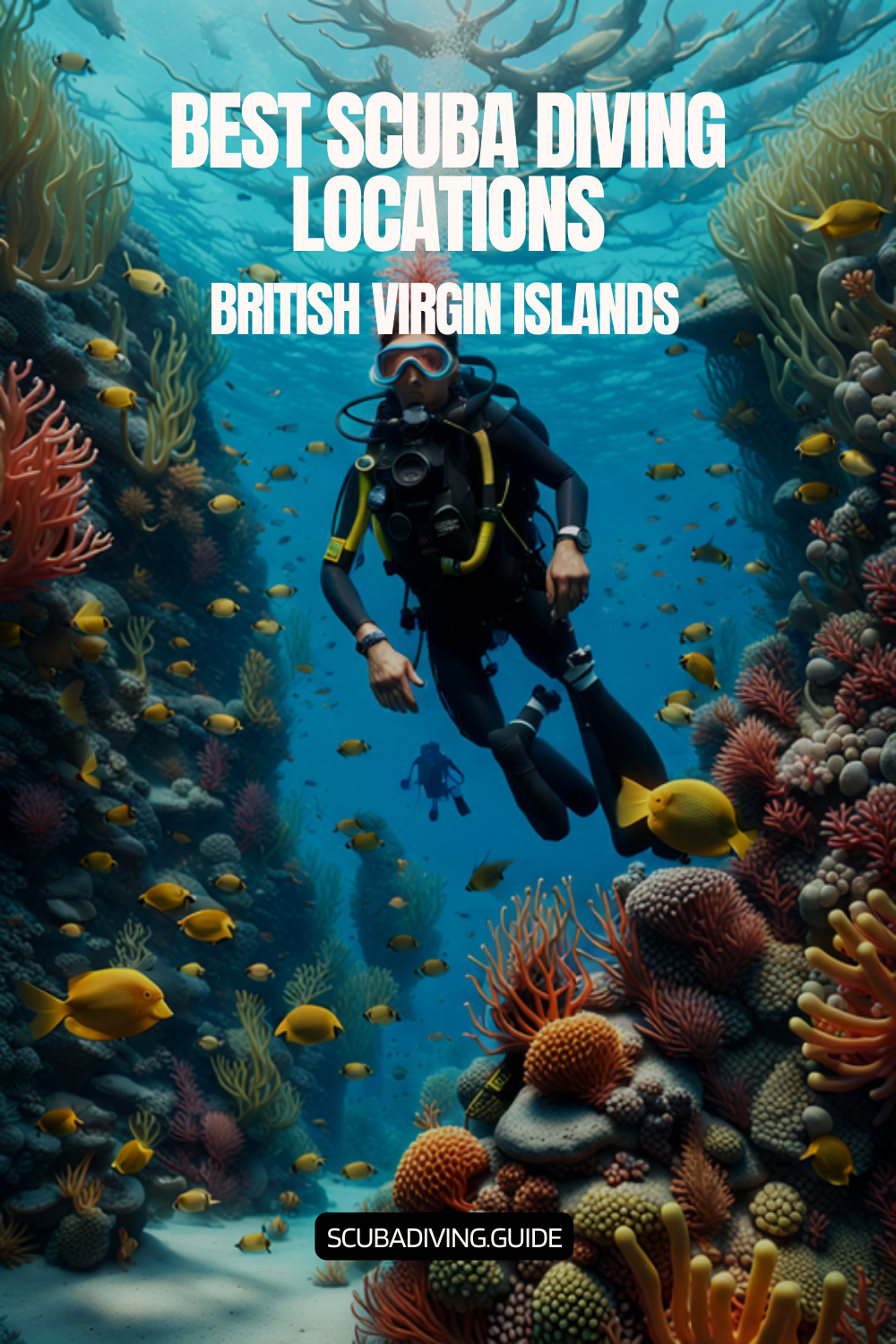
Introduction to Scuba Diving in the British Virgin Islands
The British Virgin Islands are a stunning underwater world for scuba diving fans. With more than 100 dive spots across 60 islands and tiny cays, it’s a top spot for marine exploration.
This place is home to a rich marine ecosystem. Divers can see colorful coral reefs, interesting shipwrecks, and lots of marine life. Over 80% of Caribbean fish and coral species live here, making it a dream spot for underwater explorers.
Overview of the Diving Scene
Diving in the British Virgin Islands is great for both new and seasoned divers. The area has a variety of underwater scenes, including:
- Underwater caves
- Dramatic canyons
- Stunning pinnacles
- Intricate tunnels
Best Times to Dive
The BVI has perfect diving weather all year, with water temperatures from 76°F to 84°F. The best times for diving are:
- Winter/Spring (December-April): Clear visibility (up to 200 feet)
- February-March: Chance to see humpback whales
- Summer: Warmer waters with slightly less clear visibility
“The British Virgin Islands are a underwater wonderland waiting to be explored” – Caribbean Diving Magazine
Dive sites are mostly 15 to 50 feet deep, with some deeper spots. The Sir Frances Drake Channel, an 18-mile stretch, leads to many amazing dive spots.
Top Scuba Diving Locations
The British Virgin Islands are a paradise for scuba diving. They cover 60 beautiful islands. The water is warm, between 78-82°F, and clear, up to 100 feet. This makes them perfect for underwater photography, no matter your skill level.
Dive operators are based on key islands like Tortola, Virgin Gorda, and Jost Van Dyke. Each island has its own special underwater world and marine life.
Anegada: The Hidden Reef Paradise
Anegada is a hidden gem for diving. It has pristine coral reefs. Here, you can find:
- Untouched coral formations
- Diverse marine ecosystems
- Rare marine species
Virgin Gorda: A Diver’s Dream
Virgin Gorda is famous for its dive sites, like The Baths. It’s a dream for underwater photographers. The clear waters and dramatic rock formations are breathtaking. Dives are usually 20-45 feet deep, great for all skill levels.
Jost Van Dyke: Diverse Underwater Landscapes
Jost Van Dyke is known for its diverse dive sites. You can see:
- Vibrant coral gardens
- Underwater rock formations
- Encounters with tropical marine life
“The British Virgin Islands represent a diving paradise waiting to be discovered.” – Professional Diving Enthuasiast
Each place offers a unique dive experience. Underwater photographers and diving fans will find something amazing in these Caribbean waters.
Marine Life in the British Virgin Islands
The waters around the British Virgin Islands are full of life. They offer divers a chance to see a wide range of marine life. The clear Caribbean waters are home to some of the healthiest coral reefs, making it a great place for eco-tourism and underwater adventures.
Coral Reef Ecosystems
The islands have amazing coral reef systems. Horseshoe Reef is a huge 29 kilometers long. These reefs are important homes for many sea creatures. Divers can see colorful coral in depths of 10-30 meters, with clear water up to 30 meters.
Species to Spot
Marine life lovers will find the British Virgin Islands amazing. You can see:
- Reef sharks during dives
- Sea turtles like green, hawksbill, loggerhead, and leatherback
- Rare blue dart fish in certain spots
- Big creatures like mantis shrimp
Conservation Efforts
The British Virgin Islands are serious about protecting their marine life. They have about 20 national parks for both sea and land. They focus on keeping tourism green and saving the sea.
“Protecting our marine ecosystems ensures future generations can experience the breathtaking underwater world of the British Virgin Islands.”
Eco-tourism helps keep these special places safe. It teaches visitors to dive and care for the environment.
Diving Certification Requirements
To explore the British Virgin Islands’ underwater world, you need PADI certification and diving skills. Divers must know the certification levels and training options available.
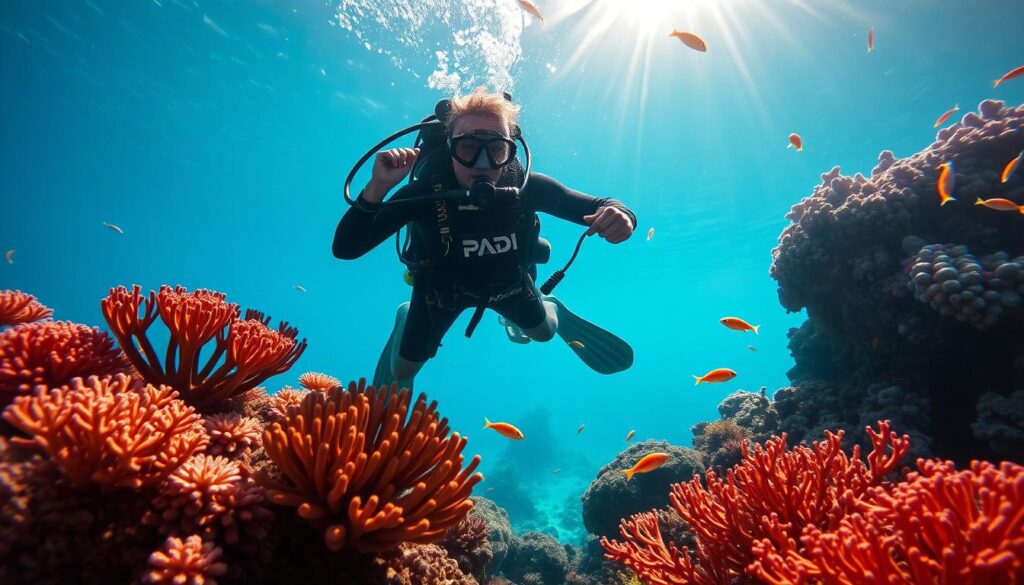
The British Virgin Islands offer diving certification programs for all levels. Whether you’re a beginner or an experienced diver, there’s a training level for you. You can choose based on your experience and comfort in the water.
Certification Levels Overview
- Discover Scuba Diving: Entry-level program with a maximum depth of 40 feet under supervision
- Open Water Diver: Complete certification for independent diving
- Advanced Open Water Diver: Enhanced skills for deeper dive environments
- Rescue Diver: Specialized course in emergency management
Recommended Dive Schools
Several top-tier dive schools in the BVI offer excellent training. Dive BVI is known for training over 10,000 divers.
| Course | Duration | Price |
|---|---|---|
| SSI Open Water Diver | 3-5 days | $600 |
| Rescue Diver | 2-3 days | $250 |
| First Aid Course | 1 day | $150 |
“Safety and skill development are key to great underwater experiences.” – Dive BVI Instructor
Water temperatures from 78°F to 82°F make diving here perfect all year. Always show your certification proof before diving.
Guided Dive Tours and Charters
Scuba diving in the British Virgin Islands is a chance to see amazing underwater sights. You’ll need local guides and professional help to explore these sites. This makes guided tours key to your underwater adventure.
Benefits of Joining a Guided Tour
Going on a guided dive has many benefits:
- Access to hidden and less-explored dive sites
- Enhanced safety through professional monitoring
- In-depth knowledge of local marine ecosystems
- Expert guidance on underwater navigation
- Real-time insights about marine life interactions
Top Dive Operators in the BVI
The British Virgin Islands have top-notch dive operators for all kinds of divers. Liveaboard dive boats offer unique underwater experiences:
| Dive Operator | Specialties | Unique Features |
|---|---|---|
| Dive BVI | Multi-location pickup services | 49 years of experience, daily dive trips |
| Cuan Law | Liveaboard diving | Comprehensive multi-day diving packages |
| Promenade | Liveaboard expeditions | Specialized underwater exploration |
“Guided dive tours transform your underwater exploration from a simple activity to an immersive learning experience.” – Professional Dive Instructor
Choosing a dive operator in the British Virgin Islands? Look at group size, safety gear, and special services. Most offer full packages with dives, gear, and expert advice for a memorable underwater trip.
Dive Experiences for Beginners
Exploring the underwater world of the British Virgin Islands is exciting for first-time divers. The clear waters offer great chances for those starting their scuba diving journey. Several introductory courses are designed to help build confidence and skills.
Introductory Scuba Diving Courses
The British Virgin Islands have many PADI certification options for beginners:
- PADI Discover Scuba Diving (DSD) – Maximum depth of 12m/40ft
- PADI Bubblemaker course for young adventurers (ages 8-9)
- PADI Open Water Diver certification for thorough training
“Every dive is a new chance to explore and learn about our amazing marine world.” – Local Dive Instructor
Safety Tips for New Divers
Safety is key for new divers. Here are some important tips:
- Always dive with a certified instructor
- Check your gear well before diving
- Keep in touch with your dive buddies
- Don’t go beyond what you’re comfortable with
If you’re not ready for scuba diving, snorkeling is a great option. It lets you see the beautiful marine life of the British Virgin Islands safely and comfortably. Many dive centers offer guided snorkeling tours.
Course prices start at $110 for intro programs and go up to $585 for Open Water Diver certification. Most beginner courses last from half a day to two days. They’re ideal for vacationers looking for a new adventure.
Advanced Diving Opportunities
The British Virgin Islands offer top-notch diving for those who love the sea. Divers looking for a challenge will find the BVI perfect. It’s a great place to explore complex underwater worlds.
Wreck Dives: Exploring Underwater Shipwrecks
Shipwrecks are the highlight of diving in the British Virgin Islands. Divers can see amazing sites like the RMS Rhone. It’s a legendary ship that’s perfect for underwater photos.
- RMS Rhone: A historic steamship located near Salt Island
- Chikuzen: A fascinating deep-water wreck that’s a big challenge
- Multiple depth ranges for experienced divers
Night Diving Adventures
Night diving changes the underwater world, showing life that’s hard to see in the day. You need special gear and skills for these nighttime dives.
“Night diving is like entering another world beneath the waves” – Professional Dive Instructor
| Night Dive Characteristics | Details |
|---|---|
| Recommended Experience Level | Advanced Open Water Certification |
| Best Dive Sites | The Baths, Cooper Island, Salt Island |
| Marine Life Visibility | Octopus, Bioluminescent Creatures, Hunting Predators |
Divers looking for deep underwater adventures need special skills and safety knowledge. They must also love exploring the hidden marine world of the British Virgin Islands.
Popular Dive Sites in the BVI
The British Virgin Islands are home to some of the most amazing dive sites in the Caribbean. They attract divers from all over the world. Each spot offers unique marine landscapes, shipwrecks, and coral reefs for unforgettable dives.
The Rhone Shipwreck: A Legendary Underwater Landmark
The RMS Rhone is a legendary dive site and one of the world’s most famous shipwrecks. It has been underwater for over 150 years. Underwater historians and marine enthusiasts love it for its rich history.
- Depth range: Varies across different sections
- Historical significance: Sunk during a hurricane in 1867
- Marine life: Abundant coral growth and diverse fish species
The Dogs: A Marine Ecosystem Marvel
The Dogs, a group of five small islets, are some of the most exciting dive sites in the British Virgin Islands. These spots have amazing marine landscapes, with detailed coral reefs and a variety of marine life.
| Dive Site Characteristics | Details |
|---|---|
| Location | Group of five islets near Virgin Gorda |
| Underwater Features | Arches, canyons, vibrant coral formations |
| Marine Life | Squirrelfish, parrotfish, basket stars |
The Chimney: A Unique Underwater Formation
The Chimney is a dive site with incredible rock formations and colorful marine ecosystems. It gives divers a unique look into the underwater world of the British Virgin Islands.
“Diving at The Chimney is like entering a hidden underwater cathedral of marine life.” – Local Dive Instructor
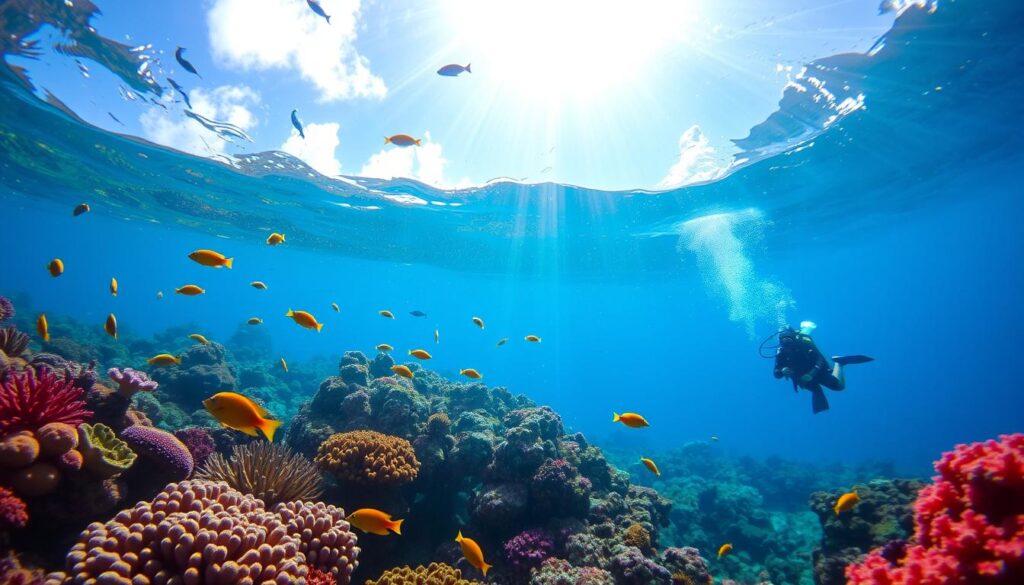
Whether you’re an experienced diver or just starting out, these dive sites offer incredible underwater experiences. You’ll see stunning shipwrecks and vibrant coral reefs.
Diving Equipment Rental
Scuba diving in the British Virgin Islands needs careful planning, including equipment rental. The BVI has many options for top-notch gear for your underwater trips.
Renting dive gear can make your snorkeling and scuba diving better in the British Virgin Islands. There are rental packages for all skill levels and preferences.
Where to Rent Gear
Dive operators across the British Virgin Islands offer great rental equipment. Key places for gear rental include:
- Scrub Island dive centers
- Virgin Gorda marine shops
- Tortola charter-based rental services
- Authorized dive operators across the islands
Rental Packages and Pricing
| Package Type | Daily Rate | Included Items |
|---|---|---|
| Explorer Package | $35 | Basic diving gear |
| Atlantis Package | $65 | Complete diving equipment set |
Tips for Choosing the Right Equipment
When picking dive gear for Scuba Diving in The British Virgin Islands, remember these key points:
- Make sure your certification matches the gear
- Check if the gear fits and feels comfortable
- Look over the gear’s condition before renting
- Find out about tank refill services
“Proper equipment can make or break your diving experience in the Caribbean.” – Professional Dive Instructor
Important Note: Rental equipment is only for certified divers. You must show a valid certification card for each package or set.
Services like equipment delivery to Tortola charters are also available. This makes getting ready for diving easy and convenient.
Environmental Awareness and Conservation
The British Virgin Islands have a beautiful marine ecosystem that needs protection. Eco-tourism helps keep these underwater worlds safe.
The BVI’s seas are full of life, covering about 50,301 square miles. Saving the coral reefs is a team effort. It involves local groups, visitors, and those who care about the environment.
Importance of Protection
Keeping the area’s biodiversity is key. The National Parks Trust of the Virgin Islands looks after 14 marine protected areas. They work hard to protect important habitats.
- Protect endangered marine species
- Preserve coral reef ecosystems
- Support sustainable tourism practices
- Maintain ecological balance
Local Conservation Initiatives
The BVI is serious about saving the sea. Here are some important projects:
| Initiative | Focus Area | Impact |
|---|---|---|
| Sea Turtle Protection | Nesting Habitat | Safeguarding vulnerable turtle species |
| Coral Reef Monitoring | Ecosystem Health | Tracking reef conditions and restoration |
| Marine Park Management | Habitat Preservation | Protecting 798 acres of marine environments |
“Our marine ecosystems are not just beautiful—they are vital to our planet’s health and our local economy.” – Environmental Expert
Visitors can help by diving responsibly. They can also join in on reef clean-ups. Supporting local groups that protect marine life is also important.
Travel Tips for Diving in the BVI
Planning a scuba diving trip in the Caribbean Islands needs careful thought. The British Virgin Islands offer amazing underwater sights for all divers. With some planning, navigating Scuba Diving in The British Virgin Islands can be easier.
Best Travel Routes
Getting to the British Virgin Islands requires smart travel choices. You have a few ways to arrive:
- Fly into Terrance B. Lettsome International Airport on Tortola
- Connect through San Juan, Puerto Rico (SJU)
- Use inter-island ferry services
- Consider private charter boats for maximum flexibility
Timing Your Visits
Choosing the right time for diving in the Caribbean Islands is key. The BVI has its own seasons to consider:
- Peak diving season: December to April
- Driest months: February and March
- Hurricane season: September to November (less recommended)
“The best diving experiences are often about timing and preparation.” – Local BVI Dive Instructor
Practical Diving Logistics
When planning Scuba Diving in The British Virgin Islands, keep these points in mind:
- Book dive trips with reputable local operators
- Verify personal dive certification levels
- Pack appropriate diving gear or plan equipment rental
- Purchase travel insurance covering water activities
Pro tip: Budget travelers can split charter expenses with fellow diving enthusiasts to manage costs effectively.
British Virgin Islands Recommended Scuba Diving Itinerary
Planning a scuba diving trip to the British Virgin Islands? To make the most of your underwater adventures, it’s essential to have a well-designed itinerary that highlights the best dive sites and ensures a diverse and memorable experience. Here, we present a recommended scuba diving itinerary that showcases the beauty and diversity of the British Virgin Islands’ underwater world.
Day 1: Arrival and Orientation
Upon arriving in the British Virgin Islands, settle into your accommodation and visit a local diving center to familiarize yourself with the diving facilities and staff. Take this opportunity to discuss your diving preferences and goals, ensuring that the itinerary is tailored to your interests and experience level. Attend a dive briefing to get acquainted with local diving regulations, safety procedures, and the unique characteristics of the dive sites you’ll be exploring.
Day 2: Dive the RMS Rhone
Start your diving adventure with a visit to the iconic RMS Rhone. This historic shipwreck offers an intriguing blend of history and marine life. Explore the wreckage’s different sections, marvel at the coral-encrusted structures, and encounter an array of colorful fish species. The RMS Rhone provides an excellent opportunity for underwater photography, capturing the fascinating blend of nature and history.
Day 3: The Indians and The Dogs
Embark on a two-tank dive excursion to The Indians and The Dogs. The Indians, a cluster of rocky pinnacles, boasts impressive coral formations and swim-throughs. Swim alongside schools of tropical fish, observe vibrant sponges and corals, and keep an eye out for resident sea turtles. Next, head to The Dogs, a group of small islands known for their diverse marine life. Explore the coral reefs, encounter rays, and marvel at the abundance of colorful fish species.
Day 4: The Chimney and Coral Gardens
Venture to The Chimney, a thrilling dive site near Great Dog Island. Descend into the chimney-like crevice and emerge into a hidden coral garden. Admire the vibrant corals, navigate through swim-throughs, and encounter larger marine species such as reef sharks and turtles. In the afternoon, dive at Coral Gardens off the coast of Cooper Island. This site showcases a breathtaking display of colorful corals and is home to fascinating critters like seahorses and octopuses.
Day 5: The Wreck of the Chikuzen and Alice in Wonderland
Explore the wreck of the Chikuzen, a Japanese refrigerator ship intentionally sunk as an artificial reef near Virgin Gorda. The Chikuzen attracts a myriad of fish species, including snappers, groupers, and jacks. Immerse yourself in this underwater oasis and witness the dynamic marine ecosystem that has developed around the wreck. In the afternoon, visit Alice in Wonderland near Ginger Island. This site features large coral formations, swim-throughs, and gorgonian sea fans, creating a surreal and enchanting atmosphere.
Day 6: The Playground and The Rhone Bow
Head to The Playground near Salt Island, a shallow dive site perfect for underwater photographers. Capture stunning images of turtles, stingrays, and schools of tropical fish in this picturesque setting. In the afternoon, return to the RMS Rhone to explore the bow section. Marvel at the towering structure covered in colorful corals and observe the vibrant marine life that has made this shipwreck its home.
Day 7: Departure
On your last day, take a moment to reflect on your incredible scuba diving journey through the British Virgin Islands. Share your experiences and dive logbook with fellow divers, and express your gratitude to the diving center staff for their guidance and support. Depart with unforgettable memories and a desire to return to this diving paradise in the future.
Please note that this itinerary serves as a general guideline and can be customized based on your preferences, weather conditions, and the recommendations of your diving professionals. The British Virgin Islands offer numerous other exceptional dive sites, and exploring additional locations can be added to further enrich your diving itinerary.
Remember to prioritize safety, adhere to diving regulations, and practice responsible diving techniques throughout your journey. With careful planning and a sense of adventure, your scuba diving itinerary in the British Virgin Islands is sure to be a thrilling and fulfilling experience.
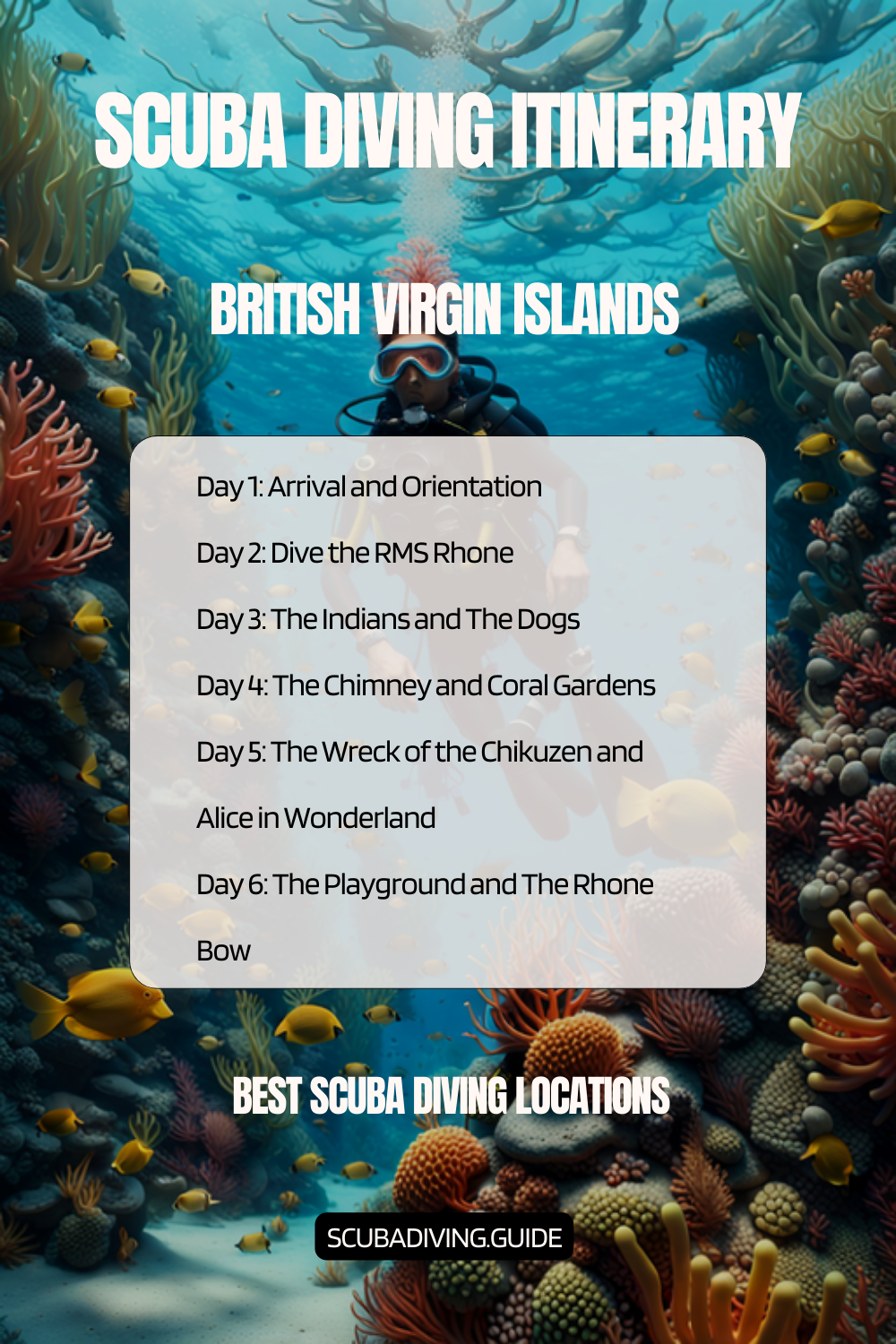
Other Countries to Consider
- Anguilla
- Antigua and Barbuda
- Aruba
- Bahamas
- Barbados
- Bonaire
- Cayman Islands
- Cuba
- Curaçao
- Dominica
- Dominican Republic
- Grenada
- Guadeloupe Islands
- Haiti
- Jamaica
- Martinique
- Montserrat
- Puerto Rico
- Saba
- Saint Barthélemy
- Saint Kitts & Nevis
- Saint Lucia
- Saint Vincent and the Grenadines
- Sint Eustatius
- Sint Maarten
- The Turks And Caicos Islands
- Trinidad and Tobago
- United States Virgin Islands
Conclusion and Next Steps
Scuba diving in the British Virgin Islands is an amazing underwater adventure. You’ll find incredible marine experiences. Dive sites like the RMS Rhone are among the top wreck dives globally.
The Caribbean Islands are home to vibrant marine ecosystems. They offer unique underwater exploration opportunities. These islands are an exceptional destination for divers.
Planning Your Diving Adventure
When planning your scuba diving trip, think about visiting from early December to late April. The British Virgin Islands have diving experiences for all skill levels. Beginners to advanced divers can find something exciting.
Plan to spend around $140 USD for a two-tank dive with local operators. Make sure to balance exploration, relaxation, and underwater discoveries in your itinerary.
Additional Resources and References
Diving enthusiasts should look into local dive operators and certification programs. Check out the British Virgin Islands Tourism Board for more information. Connect with experienced charter yacht operators who know these waters well.
Prepare for an unforgettable diving experience in the Caribbean Islands. It will be a mix of adventure, marine biodiversity, and stunning underwater landscapes.
FAQ – Scuba Diving in The British Virgin Islands
What makes the British Virgin Islands a great destination for scuba diving?
The British Virgin Islands have clear waters and a variety of marine life. You’ll find pristine coral reefs and historic shipwrecks. It’s perfect for both new and experienced divers, with many unique sites across the islands.
When is the best time to go scuba diving in the British Virgin Islands?
The best time to dive in the BVI is from November to April. The water is warm, visibility is great, and marine life is active. Avoid diving from June to November due to hurricane season.
Do I need a specific certification to dive in the British Virgin Islands?
While certification isn’t always needed, most operators require an Open Water PADI certification. Beginners can start with Discover Scuba Diving. Advanced divers will find challenging sites. Always check with local operators for specific requirements.
What marine life can I expect to see while diving in the BVI?
Divers can see sea turtles, sharks, rays, and colorful fish. Moray eels and vibrant coral are common too. Anegada is known for its diverse marine life.
Are there good options for underwater photography in the British Virgin Islands?
Yes! The BVI is great for underwater photography. You’ll find clear waters, diverse marine life, and stunning sites like the RMS Rhone. Many operators offer advice for photographers.
What are the most famous dive sites in the British Virgin Islands?
Top sites include the RMS Rhone Shipwreck and The Dogs. The Chimney and Anegada’s sites are also famous. Virgin Gorda and Jost Van Dyke have their own unique spots.
Is scuba diving in the BVI safe for beginners?
Yes, the BVI is safe for beginners. Many operators offer courses and guided tours. The calm waters and professional schools make it ideal for new divers.
How can I contribute to marine conservation while diving in the BVI?
Follow responsible diving practices and join eco-tourism initiatives. Avoid touching marine life and use reef-safe sunscreen. Support local conservation groups to protect the marine ecosystem.
